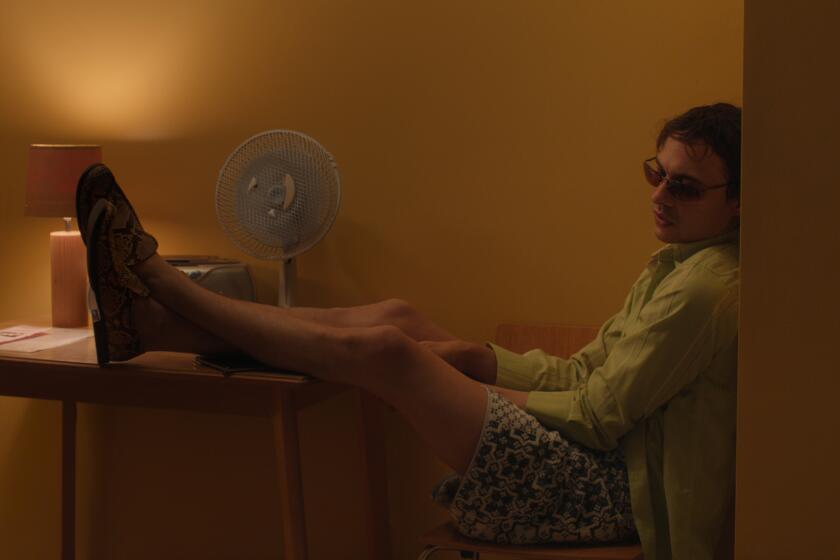‘King Creole’: Crowning Glory of Elvis Film Career
- Share via
Elvis and New Orleans.
To rock ‘n’ roll fans, the idea of that combination is every bit as mouth-watering as “champagne and oysters” or “Mozart and Vienna.”
That’s why a chance to see “King Creole,” Presley’s 1958 movie set in the birthplace of so much great American music, is so tantalizing--especially when it’s being shown on the big screen, as it is tonight at UC Irvine. A part of the school’s Film Society spring series on “cult personalities,” it’s on a twin bill with “Bus Stop” starring Marilyn Monroe.
“King Creole,” based on Harold Robbins’ melodramatic story about a busboy-turned-rock ‘n’ roll-singer who overcomes adversity in the seedy clubs and back alleys of the Crescent City’s French Quarter, reportedly was Elvis’ favorite film.
That isn’t necessarily cause for celebration, since the King always cited “It’s Now or Never” as the best record he ever made. Among most rock fans, though, there really is only one other real contender--”Jailhouse Rock”--for top honors in Elvis’ spotty film legacy. “Loving You” had a few good scenes, but that’s all, and after those movies, Elvis pretty much settled into cinematic autopilot (at least until 1969 when, in “Change of Habit,” he left Sister Mary Tyler Moore praying at the altar, agonizing whether to choose Elvis or God).
“Jailhouse Rock” probably had the single greatest musical scene of any of his films--that electrifying set piece built around the title tune. But Elvis was saddled with a preposterous story line about a young singer who kills a drunken barfly in a fistfight and gets tried, convicted and sent to prison (all within the first five minutes), serves his time (about 20 minutes worth) and is released, whereupon he finds an agent and lands a recording contract, all within 10 minutes etc., etc.
“King Creole” has a far more believable plot, beginning with the thoroughly credible notion that a performer as unique and creative as Elvis might very well have started out in a New Orleans nightclub like the one from which the movie takes its title (instead of in Memphis, a couple hundred miles north).
N’awlins, after all, probably has given the world more rock, R&B; and jazz talent per square foot than any other city. The list begins with the single greatest figure in 20th-Century American music--Louis Armstrong--and goes on to include Fats Domino (one of Presley’s chief rivals as King of the Hill in early rock), Professor Longhair, Huey (Piano) Smith, Lee Dorsey, Clarence (Frogman) Henry, the Neville Brothers and hundreds more.
Incidentally, those fellows backing Elvis on stage in the movie are pretty incredible themselves--his stellar real-life band at the time of his most fertile music-making: guitarist Scotty Moore, bassist Bill Black, drummer D.J. Fontana and the Jordanaires vocal quartet.
“King Creole” certainly has a higher percentage of musical highlights than most of Elvis’ films. There’s the moody opening number, “Crawfish,” in which Elvis spins a ballad on top of the sing-song cries of black street vendors as they stroll the vacant, puddle-filled walkways of the early morning French Quarter, hawking strawberries, gumbo and--natch--crawfish.
Then there’s his no-holds-barred performance of “Trouble” (not to be confused with his 1975 semi-hit “T-R-O-U-B-L-E”), the number he uses to tell the town’s mobster kingpin Maxie (brilliantly played by Walter Matthau) that busboy or no, he is not to be messed with:
If you’re lookin’ for trouble
You came to the right place
If you’re looking for trouble
Just look - uh right in my face
I was born standin’ up
And talkin’ back . . .
Because I’m evil . . . my middle name is misery
Even now, 32 years later, it’s remarkable how many chills Elvis still generates with the vocal quiver he puts on the word born , and his pause between “standin’ up” and “talkin’ back.”
“King Creole” also benefits from bristly dialogue, such as this snappy exchange between Elvis (whose character is named Danny Fisher) and Carolyn Jones as Ronnie, a former singer who, like most of the others in this movie, is under Maxie’s all-encompassing thumb.
Ronnie: Maxie wants you to quit (the King Creole) and go to work for him.
Danny: What are you supposed to do about it?
Ronnie: Whatever I can do about it.
Danny (with a sneer): Your heart wouldn’t be in it.
Ronnie: You wouldn’t miss it.
Awright, so none of Elvis’s movies ever made anyone believe he was a threat to Brando. But in the best moments of “King Creole,” Elvis still showed the world the toughest, sexiest most talented performer in the history of rock ‘n’ roll. And that was no act.
“King Creole” will be screened tonight at 7, followed at 9 by “Bus Stop,” in UC Irvine’s Social Science Lecture Hall. Tickets: $4 (general), $3 (UCI affiliates and senior citizens), $2 (UCI students). Information: (714) 856-6379.
More to Read
Only good movies
Get the Indie Focus newsletter, Mark Olsen's weekly guide to the world of cinema.
You may occasionally receive promotional content from the Los Angeles Times.










